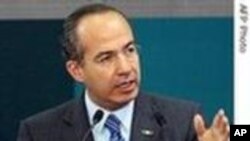<!-- IMAGE -->Pursuant to the Merida Initiative, authorities in the United States and Mexico are working closely to combat drug trafficking.
With narcotic-related violence spilling over both sides of the border and Mexican drug cartels already operating in U.S. cities, enhanced cooperation and partnership is critical for both the United States and Mexico.
Merida assistance for Mexico in 2009 is seven-hundred twenty million dollars and will fund a wide range of activities ranging from the provision of inspection equipment and aircraft, to law enforcement and judicial professionalization and victim protection. So far in 2009, results include the arrest of Vicente Carrillo Leyva, one of the leaders of the powerful northern-based Juarez cartel, and the dismantling in June by the Mexican army of the largest methamphetamine laboratory in Latin America. As Under Secretary of Homeland Security Alan Bersin said, by working together both countries “can stop the flow of drugs, curb cartel violence, and assure mutual security.”
While supporting the efforts of the Mexican government, the United States is also ramping up its own counter-narcotic initiatives. Last February, Attorney General Eric Holder announced the conclusion of a multiagency law enforcement investigation known as Operation Xcellerator. By the end of this 21-month long effort, 755 individuals had been arrested and more than 23 tons of narcotics had been seized in coordination with Mexican and Canadian authorities.
The United States is also targeting the guns and illegal financing that make drug trafficking possible. In Operation Armas Cruzadas, U.S. and Mexican law enforcement agencies are partnering against arms trafficking along the shared border. With Operation Firewall, the Department of Homeland Security aims at severing the cartels’ finances by targeting bulk cash smuggling.
The United States Government remains committed to succeeding in the struggle against drugs and organized crime. As Secretary of State Hillary Rodham Clinton said during her last trip to Mexico, “This is one of the most important relationships that exists between any two countries in the world. We are part of the same family, we share this continent as our common home, and we will inhabit a common future.”
With narcotic-related violence spilling over both sides of the border and Mexican drug cartels already operating in U.S. cities, enhanced cooperation and partnership is critical for both the United States and Mexico.
Merida assistance for Mexico in 2009 is seven-hundred twenty million dollars and will fund a wide range of activities ranging from the provision of inspection equipment and aircraft, to law enforcement and judicial professionalization and victim protection. So far in 2009, results include the arrest of Vicente Carrillo Leyva, one of the leaders of the powerful northern-based Juarez cartel, and the dismantling in June by the Mexican army of the largest methamphetamine laboratory in Latin America. As Under Secretary of Homeland Security Alan Bersin said, by working together both countries “can stop the flow of drugs, curb cartel violence, and assure mutual security.”
While supporting the efforts of the Mexican government, the United States is also ramping up its own counter-narcotic initiatives. Last February, Attorney General Eric Holder announced the conclusion of a multiagency law enforcement investigation known as Operation Xcellerator. By the end of this 21-month long effort, 755 individuals had been arrested and more than 23 tons of narcotics had been seized in coordination with Mexican and Canadian authorities.
The United States is also targeting the guns and illegal financing that make drug trafficking possible. In Operation Armas Cruzadas, U.S. and Mexican law enforcement agencies are partnering against arms trafficking along the shared border. With Operation Firewall, the Department of Homeland Security aims at severing the cartels’ finances by targeting bulk cash smuggling.
The United States Government remains committed to succeeding in the struggle against drugs and organized crime. As Secretary of State Hillary Rodham Clinton said during her last trip to Mexico, “This is one of the most important relationships that exists between any two countries in the world. We are part of the same family, we share this continent as our common home, and we will inhabit a common future.”




